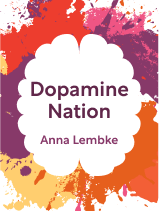

This article is an excerpt from the Shortform book guide to "Dopamine Nation" by Anna Lembke. Shortform has the world's best summaries and analyses of books you should be reading.
Like this article? Sign up for a free trial here.
What does Anna Lembke say about addiction in modern society? How could your daily habits and activities lead to addiction?
In her bestselling book, Dopamine Nation, author Anna Lembke explains how pleasure and pain motivate you to overindulge in pleasurable activities. According to Anna Lembke, addictions can take hold when you have a hard time stepping away from your favorite indulgence.
Keep reading to learn Lembke’s advice for identifying daily behaviors that could lead to addiction.
Anna Lembke: Addiction in Daily Life
In Dopamine Nation, Stanford University psychiatrist and addiction treatment expert Anna Lembke argues that addiction is just an extreme form of a universal problem: the compulsive pursuit of neurochemical rewards at the expense of your own happiness. According to Anna Lembke, addiction treatments for severe addicts can work for everyday overindulgence as well.
Most people have issues controlling their consumption of pleasurable things—such as junk food, pornography, social media, or binging on their favorite YouTube channels. Lembke draws on contemporary neuroscience and the stories of her patients to take a close look at the reasons for overindulgence and provide clear directives on taking back control of your behavior.
| What Counts as an Addiction? Anna Lembke argues that the treatments helpful to severe addicts will shed light on how you can control your everyday compulsive behaviors. However, it’s worth considering that psychologists are not in complete agreement with each other about what should be considered an addiction, and may therefore disagree with Lembke, asserting that we must draw sharper distinctions between various forms of overindulgence. Some argue that the term “addiction” has become overused in everyday speech. They contend that thinking of everything as an addiction muddies the waters about specific treatments for specific issues. These psychologists advocate a narrower definition of addiction: a neurological dependency on outside chemicals not normally found in the brain. Under this rubric, cocaine can be an addiction, but sex cannot. |
Anna Lembke explains that overindulgence is a widespread and growing issue in terms of addiction. She attributes this growth to the interaction of three distinct factors.
1. Human brains evolved to thrive in scarcity. Your brain is designed to solve the problem of scarce resources. In our early hunter-gatherer days, food and other resources were hard to find, and those who had the strongest motivation to seek it out would have an advantage. Because obtaining pleasurable goods—such as food—results in the release of a neurochemical reward, your brain has evolved a very strong motivation to continue pursuing pleasurable goods.
(Shortform note: To understand why our brains are primed for pursuit of pleasure, it helps to recognize that desire is a much stronger motivator than possession. In Robert Greene’s The Laws of Human Nature, he argues that having something will only provide a brief experience of satisfaction before desire will motivate you to pursue something else. This means your mind’s evolved motivation for neurochemical rewards is perfectly tuned to repetitively seek out a reward.)
2. Industrialization provides abundance. People in industrialized nations now experience an abundance of food, entertainment, narcotics, and other pleasure-inducing goods. The intense motivation to seek neurochemical rewards that served your ancestors so well now leads to overconsumption—your brain still behaves as if you could run out of these pleasurable goods at any moment, and encourages excessive pursuit.
3. Leisure time provides opportunities for overconsumption. In industrial societies, survival requires less daily effort: You no longer have to gather food all day or move every time there’s a drought. The consequent increase in leisure time creates opportunities for compulsive consumption—when you don’t have to spend your time on basic survival, you can redirect that time to pleasurable activities. Hunter-gatherers didn’t have time to play video games all day, but people in industrial societies often do.
| Abundance, Indulgence, and Addiction Anna Lembke contends that the overabundance found in industrial societies creates opportunities for an addiction to compulsive overindulgence. In other words, she says, greater supply leads to greater demand. However, some would disagree with this formulation. The economist John Maynard Keynes rejected the idea that supply could create demand. He argued that if people desired things simply because they were abundant, then businesses could make money by producing anything they wanted—there would always be a market for their products. He contended that businesses are only profitable when they produce supply in response to the consumer demand that already exists. That said, Anna Lembke’s position on addiction has strong advocates as well. David T. Courtwright (The Age of Addiction) argues that demand for addictive goods such as alcohol and cigarettes doesn’t follow the demand-before-supply model perfectly. Companies that sell addictive goods have an incentive to try to get customers “hooked” on their products by making these products easily available. The greater the supply, the easier it is to get a “first dose” into the hands of prospective consumers. For example, when alcohol companies sponsor sporting events, concerts, and festivals, their goal is to make their brand of alcohol abundant and easily accessible so that people will try it—and eventually, become addicted. He argues that through these strategies, businesses are able to leverage the abundant supply of their addictive goods to create future demand for their products. |
Result: Perfect Conditions for Overindulgence
These three factors work together to create a dangerous cycle of overindulgence: Your brain is fine-tuned to keep consuming pleasurable goods—and now you have an abundance of these goods and plenty of time to consume them. Anna Lembke asserts that rising overconsumption is behind a well-documented decrease in happiness among industrialized nations, and she highlights the rise in addiction-related deaths in all age groups between 1990 and 2017.
Identifying Your Cycle of Overindulgence
Anna Lembke writes that the difficulty in recognizing your patterns of behavior lies largely with a lack of self-awareness or unwillingness to acknowledge patterns of addiction. A good place to start gaining clarity about your behavior or acknowledging the existence of a pattern may be comparing your behavior to standards used by psychologists to diagnose addiction.
Psychologists see addiction as a process with three sequential stages. As you read, consider whether any of these sound familiar:
- Misuse: Someone misuses a pleasurable activity when they are using it to alleviate or distract from emotional or physical pain. Pay close attention to why you are indulging in your high-dopamine activity. For example, are you having an alcoholic drink to have fun with your friends or because you had a hard day at work?
- Abuse: This stage is characterized by heavier overindulgence to maintain the pain alleviation effects. You may be at this stage if you notice that you’ve built up a tolerance to your pleasurable activity. Are you engaging in the activity for longer periods than you used to, or ingesting higher doses of a substance?
- Addiction: A repetitive cycle of abuse becomes a full-blown addiction once someone begins putting great effort into accessing their pleasurable activity. They also begin to suffer the consequences of their overindulgence in their relationships, mental health, and financial well-being. To understand if you’ve reached this stage, ask yourself two questions. How did you respond the last time you weren’t able to access your pleasurable activity? Secondly, what has pursuing this activity cost you (financially, emotionally, and socially)?

———End of Preview———
Like what you just read? Read the rest of the world's best book summary and analysis of Anna Lembke's "Dopamine Nation" at Shortform.
Here's what you'll find in our full Dopamine Nation summary:
- What causes addictive behaviors and how to take back control
- How pleasure and pain motivate you to consume
- Strategies for keeping your brain’s natural chemicals in balance






